Story of Nakula
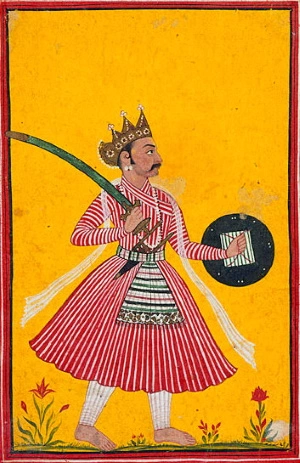
Nakula and Sahadeva were the youngest among the Pandavas in Mahabharata.
They were twins.
Their father was Pandu, and their mother was Madri.
Mysterious birth
Nakula and Sahadeva were incarnations of Ashwini Kumaras, the divine physicians.
Kunti was given a mantra by Sage Durvasa.
With that mantra, she could call any Deva and get blessed to get a child.
Kunti called Dharmaraja, Vayu, and Indra and they blessed her with Yudhishtira, Bhima, and Indra respectively.
Then Pandu asked Kunti to get children for his second wife Madri as well.
Kunti called Madri and told her to think about any Deva.
Madri thought about Ashwini Kumaras.
They came and blessed her with Nakula and Sahadeva.
Between the twins, Nakula was the elder one.
The Pandavas were incarnations of these Devas who came to earth to assist Lord Krishna in eliminating evil and re-establishing dharma.
The union of the Devas with Kunti and Madri were in the yogic plane and not physical.
Click below to listen to Ashwini Kumara Stotram
Son of Nakula and Draupadi
Shataneeka (शतानीकः)
Nakula and Karenumati
In addition to Draupadi who was the common wife of the Pandavas, Nakula also married Karenumati (करेणुमती), the princess of Chedi.
Niramitra (निरमित्रः) was the son born to them.
The digvijaya yatra
After they established themselves at Indraprastha, the Pandavas conducted a Rajasuya yaga.
Rajasuya involves subjugating other kingdoms and making them to pay tax.
Military expeditions are conducted in all directions for this.
Nakula conquered the kingdoms to the west of Indraprastha.
As Nakula moved towards the west with his army, the earth trembled due to their lion-like roars and the rumbling of the wheels of their chariots.
Nakula conquered Rohitaka, Sarishaka, Mahetta, Rajarshi Akrosha, Dasharnas, Sibis, Trigthas, Ambashtas, Malakas, Karpasas, Madhyamakas, Vatadhanas, Utsavatanketas, Gramaniyas, Abhiras, Panchanadas, Uttarajyotisha, Divyakata, Dwarapalas, Mlecchas, Pahlavas, Barbaras, Kiratas, Yavanas, and Sakas.
In Madra, he was welcomed and offered gifts by his uncle Shalya (Madri's brother).
It is clear that Nakula's digvijaya yatra extended up to the Red Sea and the Mediterranean covering territories including Iran (Madra) and Greece (Yavana).
Nakula brought back to Indraprastha 10,000 camel loads of wealth after his conquest of the West.
Qualities of Nakula
- Nakula was very handsome
- His complexion was similar to copper
- His eyes were long
- Nakula was soft-spoken
- His arms were strong
- His neck looked like that of a lion
- His eyes were red
- He showed humility towards everyone
- Nakula was one of the best among swordsmen
- He was an expert chariot warrior
- He was a Maharatha
- Mahabharata calls Nakula master of every weapon
- He had sound knowledge of horses
- Nakula had mastery over making vyuhas (formations) on the battlefield
Kaurava seniors appreciating Nakula's qualities
During his lamenting in front of Sanjaya at the end of the war, Dhritarashtra says: I had lost all hopes of winning the war when I heard that Madri's son Nakula turned out to be as powerful as Ashwatthama.
He kept on taking his chariot in circles around Ashwatthama single-handedly.
Vidura has appreciated Nakula's skill at generating wealth.
Sanjaya once speaks about the six qualities of Nakula: Respect for elders, not going around speaking his opinions and intentions, humility, self-control, radiantly handsome, courage.
Bhishma to Sanjaya on Nakula and Sahadeva: They are as powerful as Indra.
Nobody can defeat them in battle.
They are very skillful with weapons.
Their hands are light.
They can shoot arrows to great distances.
Their minds are steady.
They are vengeful and full of anger.
They are as strong as lions and have got tremendous energy.
Nakula vows to destory the Kauravas
After being cheated at the game of dice, Nakula had vowed: I will kill all these Kauravas who have insulted Draupadi.
They wanted to please Duryodhana.
I will remember what all they said in this sabha and eliminate them.
There will not be a single son of Dhritarashtra left on the surface of the earth.
Abduction of Draupadi
During the vanavasa, Jayadratha tried to abduct Draupadi.
A terrible battle took place between the Pandavas and Jayadratha's army.
During this battle, Nakula went on beheading the enemy soldiers.
Kshemankara and Mahamukha attacked Nakula and showered arrows upon him from both sides.
Nakula killed them both.
Trigarta king Suratha made his elephant catch Nakula's chariot and drag it around.
Nakula cut off the head, trunk, and tusks of the elephant and got out.
Nakula dies and comes back alive
In the episode of the Yaksha-prashna, Nakula was the first one to go to the lake.
His life was taken by the Yaksha along with the other three brothers.
Yudhishtira later brought them back to life after answering the questions of the Yaksha.
Nakula during ajnatavasa
Nakula had sound knowledge about horses.
He was fond of horses and was a good horse trainer as well.
He could sense every mood of horses and bring under control the most untamable ones.
That's why he took up the job of the horse-keeper of King Virata while living incognito for one year.
His name was Granthika during ajnatavasa.
Seeing his stable becoming filled with healthy and powerful horses, Virata used to reward Nakula liberally.
It was Nakula who hid Pandavas' weapons on top of a tree in a cremation ground before entering into ajnatavasa.
When Trigartha king Susharman attacked Virata, Nakula killed seven hundred of his soldiers.
Nakula's weapons
- Nakula's bow had brilliant golden suns engraved on it radiating light all around. His quiver had golden wings.
- His powerful sword had a sheath made of goatskin.
- Nakula's shankha was Sughosha.
- Nakula's flag had the sign of a Sharabha (a fierce bird) with a golden back.
- Nakula's bow was called Vaishnava.
- During the battle of Kurukshetra, Nakula's chariot was drawn by horses gifted by Indra.
Nakula in the battle of Kurukshetra
- During the battle, Nakula was assigned the task of eliminating Uluka (Shakuni's son) and the Saraswatas. From the Kaurava side, Kritavarman was assigned to face Nakula.
- During the battle, Nakula had fierce fights with Bhishma, Drona, Karna, Duryodhana, Dusshasana, Shalya, the Trigarthas, Vikarna, Alambusha, Kritavarman, and the king of Anga.
- Nakula and Dusshasana faced each other once. Nakula cut Dusshasana's flagpost and bow and pierced him with twenty-five arrows. Dusshasana also killed Nakula's horses and cut down his flagpost.
- Nakula faced his own maternal uncle Salya and Salya killed Nakula's horses. After leaping down from the chariot, he mounted Sahadeva's chariot and both together fought Salya. Nakula and Sahadeva together once again faced Salya and pierced him with seven arrows. In another fight with Salya, Nakula killed Salya's horses and charioteer. After that, Nakula blew his shankha in excitement.
- When Bhishma destroyed Yudhishtira's chariot, Nakula saved him by taking him on board of his own chariot. During the fight with Bhishma, Nakula was injured with three arrows and Nakula retaliated by piercing Bhishma with twelve arrows.
- Vikarna had to once create a magical wall of arrows to protect Bhishma from Nakula. Vikarna also struck Nakula with sixty arrows. Nakula answered him with seventy-seven arrows.
- In the battle between Alambusha and the Pandavas, Alambusha wounded Nakula with seventy-three arrows. Nakula shot back three hundred arrows at him.
- On another occasion, Nakula attacked Kritavarman with a hundred arrows.
- Nakula also faced Dronacharya many times during the battle.
- Shakuni made Nakula unconscious once. Nakula recovered soon and Shakuni had to flee soon under attack by Nakula.
- Duryodhana once successfully resisted Nakula's attack.
- Karna once killed Bhima's two charioteers and horses. Bhima was rescued by Nakula then.
- Nakula once told Karna it the battlefield: You are the root cause for all the evils that the Kauravas have done and this terrible war. It is the will of God that you are before me today. I will not let you go. In the fierce fight that ensued, divine weapons were used. But in the end, Nakula had to withdraw and suffer humiliation.
- Nakula killed the king of Anga during the battle of Kurukshetra.
After the battle
After the Pandavas regained their kingdm, and Yudhishtira became the king, Nakula was given the duties of supervision of military resources and management of military manpower.
Nakula was given the palace of Durmarshana.
Nakula learns about the origin of the sword from Bhishma
Sword was Nakula's favorite weapon.
While Bhishma Pitamaha was on the bed of arrows Nakula went and asked him about how the sword came into existence.
Bhishma said: The sword was first revealed by Brahma during a yaga which great Rishis were conducting.
At that time, it was a living creature; tall, lean, dark, and with sharp teeth.
There were flames coming out of it.
Brahma named it Asi and said it was meant for the protection of the world.
Then it transformed itself into the gleaming weapon with a sharp edge.
It was first given to Rudra.
When Rudra took it in his hand, it grew and touched the sky.
The sword also developed four arms.
Flames were coming out of its mouth.
Rudra started whirling the sword looking for an enemy to fight.
Rudra soon started killing Asuras by thousands.
After destroying Asuras, Rudra gave the sword to Vishnu who in turn gave it to Marichi.
From Marichi, the Maharshis got it and from him the Lokapalakas.
The Lokapalakas gave it Manu, the first-ever king.
They told Manu that the sword had dharma in its womb.
It should be used to punish those who do evil and to protect the innocent.
All punishments in the world are different forms of the sword only.
From Manu, the sword came down through a series of gurus and shishyas up to the Pandavas.
The Pandavas got the sword from Kripacharya.
The sword came into existence on a Krittika Nakshatra day and its lord is Agni.
Nakula's fall during ascend to Swarga
As the Pandavas started climbing Mount Meru in a state of dhyana, it was Draupadi who fell first, after her Sahadeva.
Draupadi fell because of her bias for Arjuna.
Sahadeva fell because of his pride in his own intelligence.
Then fell Nakula.
Nakula fell because he thought none was equal to him in physical beauty.
But ultimately Nakula and Sahadeva being incarnations of Ashwini Kumaras went back to Swargaloka.
His Philosophy
- Vedas recommend action.Even Devas perform yajnas. Even they are dependent on the results of their action. Forefathers are impartial. They shower rain for both the believers and non-believers alike. Even they are engaged in action. Only those who follow the path of the Devas and engage in action will attain Swagaloka.
- The life of the family man is the most superior. Those who earn and then give it for noble acts such as yajnas are the true renouncers. Those who skip the family life and move on to sanyasa are moving in the darkness.
- Once, all the four ashramas (brahmacharya, garhastya, vanaprastha, and sanyasa) were weighed on a balance. Householdership (garhastya) was placed on one side of the balance. It took all the other three ashramas on the other side to counter-balance it. That's why great Rishis always had a family. Someone who takes responsibility for his family and does not desire anything out of it is a real sanyasi. A man does not become a sanyasi by abandoning everything. He has to cut all internal and external attachments. The deeds of the family man are for the benefit of others.
- Someone who relinquishes his family without first having conquered desires is a sinner and would be punished by Yamaraja.
- Karma done out of pride will not yield any result. Karma done without expecting any result only shall be fruitful in the spiritual realm.
- Peace, purity, self-control, bravery, honesty, simplicity, sacrifice, perseverance, and righteousness are virtues prescribed by the Rishis.
- The Lord created living beings including trees, plants, and herbs so that he can be worshiped using them in yajnas. Someone who wants to perform yajnas has to overcome so many obstacles. Only the most discerning and committed will be able to perform yajnas. That's why those who have resources and do not perform yajnas are sinners.
- No doubt, learning of Vedas, and meditation are great sacrifices. But if a king doesn't spend on great yajnas like Rajasuya, and Ashwamedha, it only shows a lack of faith.
- Charity and protection of his subjects are the duties of a Kshatriya. If he fails in them, then he shall incur sin.
- If we (the Pandavas) wander about without meeting our responsibilities towards our forefathers, without performing yajnas, and without bathing in holy tirthas, we will have to take birth as pishachas.
- Only by practicing the prescribed duties, a Kshatriya can attain greater worlds.
Recommended for you
Sutak Rules For Relatives After Death
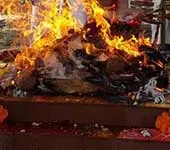
Here is a comprehensive list of the periods of mourning after the death of a relative.....
Click here to know more..Sri Hari only saves rationalists also
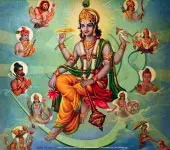 Click here to know more..
Click here to know more..
Ayyappa Sahasranamavali
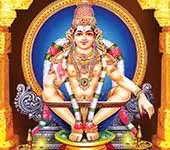
गणानां त्वा गणपतिं हवामहे कविं कवीनामुपवश्रवस्तमम्। ज्....
Click here to know more..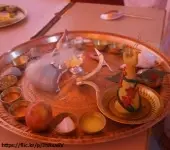
English Topics
Rare Topics
Click on any topic to open
- 237 The Practice of Bhojana Sadhana
- 236 Words of Wisdom - 2
- 235 Defining Goodness - Sanatana Dharma's Perspective
- 234 Vibhishana in Ramayana - A Tale of Morality, Loyalty, and Redemption
- 233 God will not let you break
- 232 A Glimpse into the 64 Arts
- 231 Chembai Vaidyanatha Bhagavatar - A Carnatic Maestro's Musical Odyssey
- 230 Understanding Adhyāsa: A Closer Look at False Attribution
- 229 Is Family's Permission Necessary For Becoming Sanyasi ?
- 228 Faith In Upasana
Please wait while the audio list loads..
30
Ganapathy
Shiva
Hanuman
Devi
Vishnu Sahasranama
Mahabharatam
Practical Wisdom
Yoga Vasishta
Vedas
Rituals
Rare Topics
Devi Mahatmyam
Glory of Venkatesha
Shani Mahatmya
Story of Sri Yantra
Rudram Explained
Atharva Sheersha
Sri Suktam
Kathopanishad
Ramayana
Mystique
Mantra Shastra
Bharat Matha
Bhagavatam
Astrology
Temples
Spiritual books
Purana Stories
Festivals
Sages and Saints

